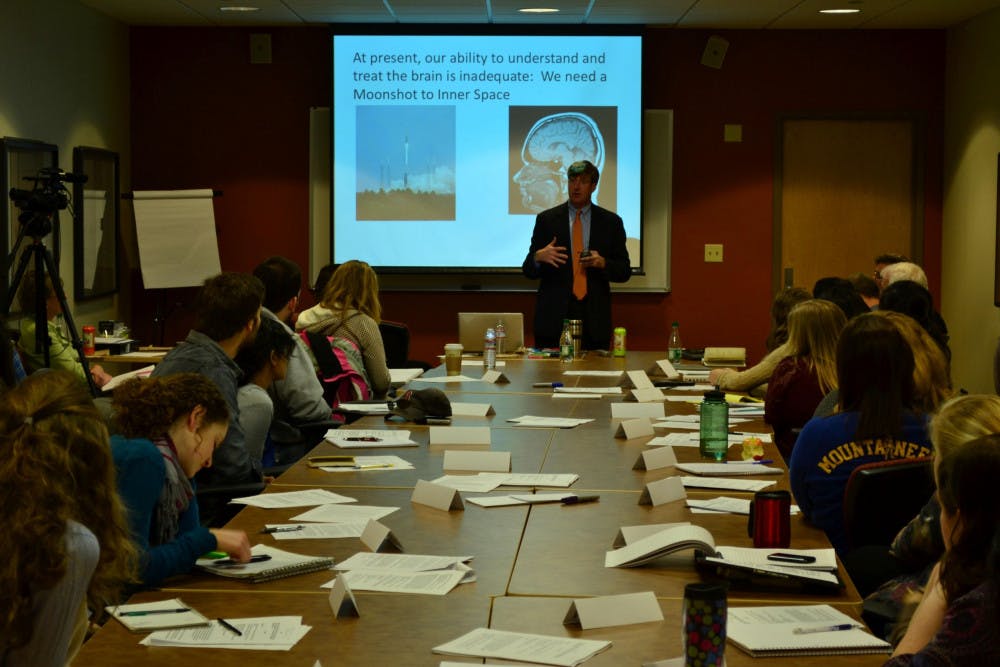Taking PHP 1680J: "The Race To Inner Space: Conflating Science, Politics and Economics To Promote Brain Health" might be one of the most important things 24 Brown students ever do. At least, that's what Patrick Kennedy, former R.I. congressman and visiting fellow in brain science, suggested after the seminar's first meeting yesterday.
Kennedy is co-teaching the class — a public health seminar — with Judy Bentkover, adjunct professor of health services, policy and practice, and Robert John Davenport, associate director of the Institute for Brain Science. Though Bentkover is listed as the primary instructor, Davenport said it will be a discussion-based class with each instructor providing expertise from different fields.
"What the students really get out of it is having this unique experience with this set of instructors and guest lecturers," Davenport told The Herald.
The class, which drew between 25 and 30 students for its first meeting, will strive to "identify the future of brain research," Bentkover said during the class. "We want you to create useful, usable documents to find a cure for brain disease."
Students will divide into teams of four to research specific disorders and diseases. Kennedy said the work students do could help identify the best ways to implement existing legislation regarding mental health treatment.
Kennedy, Bentkover and Davenport will specialize in different elements of the class. Kennedy will discuss his political advocacy for awareness of mental health issues, and Bentkover will contribute an understanding of the economics of health care. Davenport will talk about the neuroscience behind brain disorders.
"Having so many talented young people here at Brown think about these things is good for our country, and I think it's important," Kennedy told The Herald. "The answers to these challenges are going to affect each of them in their lives in both personal ways and in broader societal ways."
Kennedy also spoke about his struggles with depression and addiction, which became public when he was cited for driving under the influence in 2006. Kennedy was the lead sponsor of a 2008 mental health parity bill that made mental health patients as eligible for health insurance as those suffering from physiological diseases.
Though the bill became law four years ago, it has yet to go into effect due to pushback from insurance companies, Kennedy said. Through their research and ideas, the students in the class will help "shape how that policy will be implemented," he told The Herald. Students at Brown are "good critical thinkers," he said, and because they are not steeped in current mental health debates, they may be able to bring fresh perspectives.
"We may be going about it all wrong in terms of the bigger picture, and when you have people who are willing enough to question the very premises by which the current group-think is being predicated, you're in a place I think is rich with opportunity," he told The Herald.
The idea for the course was conceived through discussions between Kennedy and the Institute for Brain Science. After Kennedy announced his decision not to run for reelection to Congress in 2010, the University began to speak with him about ways he could expand his role as a visiting fellow. Kennedy told The Herald he had worked with the University before and saw teaching as an "opportunity to stay affiliated with the state and also with a university that has a fantastic reputation."
The class will be filmed both for the University and for Kennedy's nonprofit, One Mind for Research. Though video will be used for research and not for public relations, students attending were required to sign waivers allowing the University and the foundation to use that material as they see fit.
Angell Shi '13, a neuroscience concentrator, said she would definitely take the class if she received a spot. She said she did not know previously that Kennedy would co-teach the class, but she found the course description interesting and was attracted by the previously listed professors.
"It really seems like a groundbreaking idea," she said.
Amy Traver '12, a human biology concentrator, said she was drawn to the class primarily for its subject matter, though she ended up deciding the class did not fit into her schedule.
"It almost felt like we were like a task force," she said. "Having an opportunity to spend time on a real-world strategy is refreshing."
Davenport said students who "take the subject matter personally" will be best suited to the class.
"It's not a science course in that you have to have a science prerequisite," he told The Herald. Rather, students of different fields will contribute different perspectives, from the details of neuroscience to the intricacies of public health policy.
During the class, students offered their own ideas about the use of the word "normal," discussed the stigma attached to mental health disorders and analyzed the perception of the neural basis of psychiatric disorders.
Students shopping the class included concentrators in human biology, neuroscience, history and public health. As of Monday night, no students were registered for the course, which requires an instructor override.





